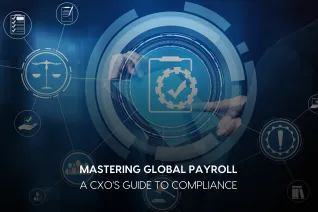Country Spotlight: Payroll in China

Boasting the world's second-largest economy and a vast workforce, China is a magnet for international businesses.
But venturing into this dynamic market requires a deep understanding of its unique regulations, especially when it comes to payroll processing. Here, we'll delve into the intricacies of paying your employees in China, ensuring a smooth and compliant operation.
What is the Salary Structure in China?
Unlike some countries, a Chinese employee's salary package goes beyond a basic monthly wage. It's a combination of several components:
- Base Salary: This forms the core of the employee's compensation and is stipulated in the employment contract.
- Allowances: These are supplements for housing, food, transportation, or other work-related expenses.
- Bonuses: While not mandatory, bonuses are a common practice, often linked to performance or annual celebrations like Chinese New Year.
- Social Security Contributions: Both employers and employees contribute to a social security system that provides benefits like pensions, healthcare, and unemployment insurance. The employer is responsible for calculating, withholding, and remitting these contributions.
- Housing Fund: This mandatory contribution goes towards a housing fund that employees can access for home purchases.
Understanding this structure is crucial for accurately calculating the total employment cost for your business.
Also Read - China: A Guideline to Payroll and Employer of Record
Taxation Matters: Individual Income Tax and Beyond
China has an individual income tax (IIT) system with progressive tax brackets. Employers are responsible for withholding IIT from their employees' salaries before paying out the net amount. Additionally, businesses need to register for and pay various taxes and levies, such as corporate income tax and value-added tax (VAT)
Level |
Taxable income subject to withholding (RMB) |
Withholding Rate(%) |
| 1 | ≤36,000 | 3 |
| 2 | 36,000 - 144,000 | 10 |
| 3 | 144,000 - 300,000 | 20 |
| 4 | 300,000 - 420,000 | 25 |
| 5 | 420,000 - 660,000 | 30 |
| 6 | 660,000 - 960,000 | 35 |
| 7 | >960,000 | 40 |
Also Read - Country Spotlight: Employer of Record in China
What are the Unique Aspects of Payroll in China
There are several unique aspects to processing payroll in China that distinguish it from other countries:
- Social Security Contributions: China has mandatory social security contributions, including pension, medical insurance, unemployment insurance, work-related injury insurance, and maternity insurance. For example, an employee earning RMB 10,000 per month might contribute approximately 8% of their salary to pension insurance, 2% to medical insurance, 1% to unemployment insurance, 0.5% to work-related injury insurance, and a small percentage to maternity insurance, depending on factors such as gender and age. Additionally, employers are required to match or contribute to these social security schemes on behalf of their employees, further adding to the total cost of employment.
- Income Tax Rates: China's income tax system is progressive, with different tax rates and thresholds based on income levels. Employers are responsible for withholding and remitting employees' income tax to the tax authorities.
Have you heard about The Hukou System?
The Hukou System is China's household registration system. It determines where a person can live and access social services based on their registered residence. It's often tied to birthplace or family origin and affects access to education, healthcare, and other welfare benefits.
- Labor Contracts and Regulations: China has specific labor laws and regulations governing employment contracts, working hours, overtime, and other aspects of employment relationships. Employers must adhere to these regulations when drafting employment contracts and processing payroll. For instance, according to Chinese labor law, the standard working week is 40 hours, with a maximum of 8 hours per day. Any work beyond these standard hours is considered overtime and must be compensated at a higher rate, typically 1.5 times the regular hourly wage. Failure to comply with these regulations can result in penalties and legal consequences for businesses, including fines and potential lawsuits from employees.
- Public Holidays and Leave Entitlements: China has designated public holidays, and employers are required to provide paid leave to employees on these holidays. Additionally, employees are entitled to various types of leave, such as annual leave, sick leave, and maternity leave, as stipulated by labor laws.
- Regional Differences: China is a vast country with regional variations in labor costs, tax rates, and social security contributions. Employers may need to consider these regional differences when processing payroll. For example, labor costs and tax rates may be higher in major cities like Shanghai or Beijing compared to smaller cities or rural areas. Additionally, some provinces or municipalities may offer incentives or subsidies to attract businesses, which can impact payroll calculations and cost projections.
- Security-Specific Certifications: The Cloud Security Alliance's C-STAR (Security, Trust, Assurance, and Risk) assessment is essential for cloud payroll providers in China. It rigorously verifies their adherence to strict security protocols, ensuring the protection of sensitive employee data. This provides companies with peace of mind and demonstrates the provider's commitment to data privacy and compliance with Chinese regulations. By choosing a C-STAR-certified cloud payroll provider like Neeyamo, businesses can mitigate risks and maintain a high level of security for their payroll operations.
Ensuring compliance with these diverse regulations and practices is vital for effective payroll management and therefore staying abreast of evolving regulations is crucial for businesses operating in this dynamic market.
Regularly reviewing your payroll processes and seeking guidance from seasoned professionals are essential steps toward ensuring both compliance and efficiency. But for truly seamless payroll processing in China, understanding local regulations and leveraging the expertise of local professionals or payroll services is paramount.
Connect with our experts today to explore cutting-edge payroll technology tailored to both local and international requirements.
Latest Resources
Stay informed with latest updates
If you're curious and have a thirst for knowledge pertaining to the HR, payroll, and EOR universe, don't miss out on subscribing to our resources.

















